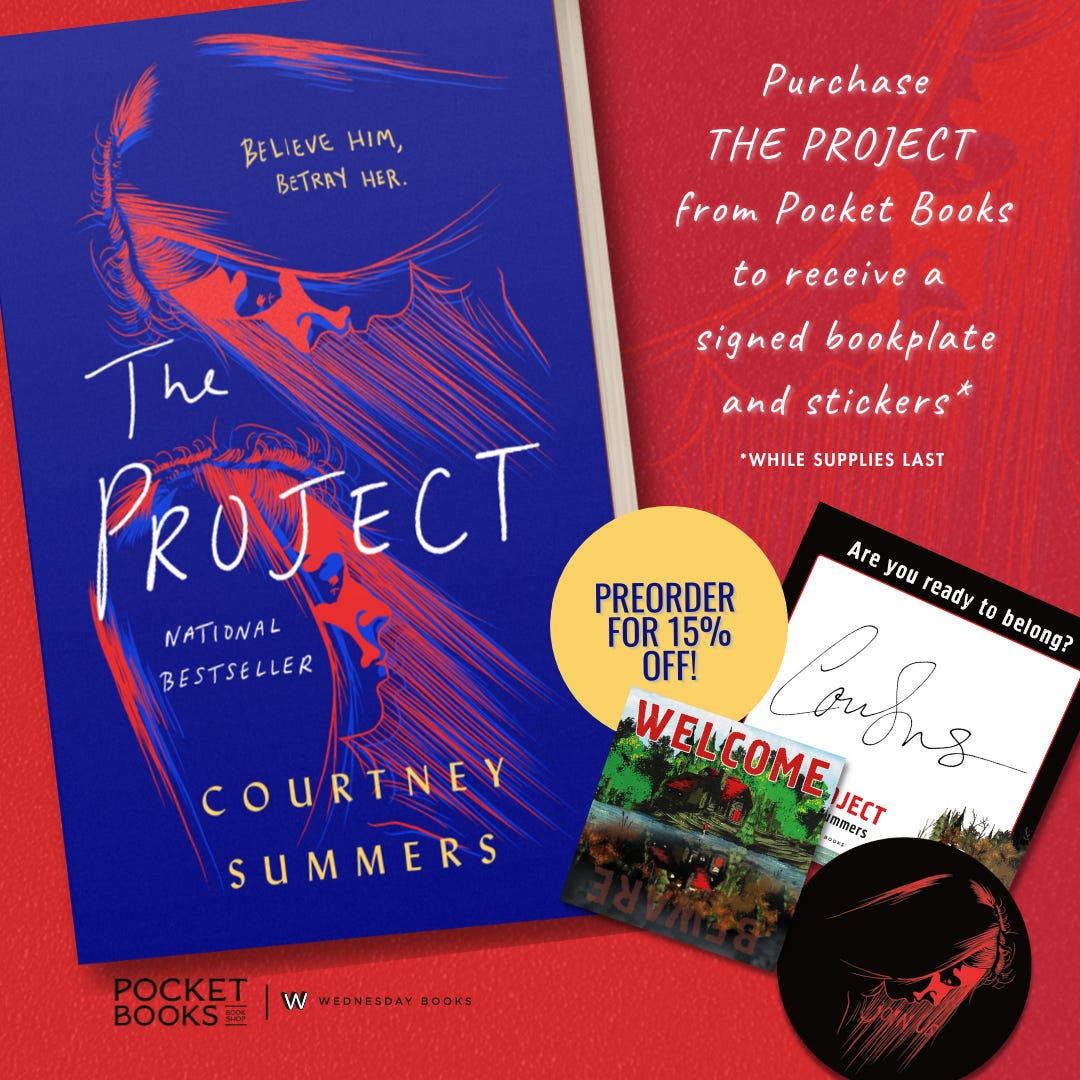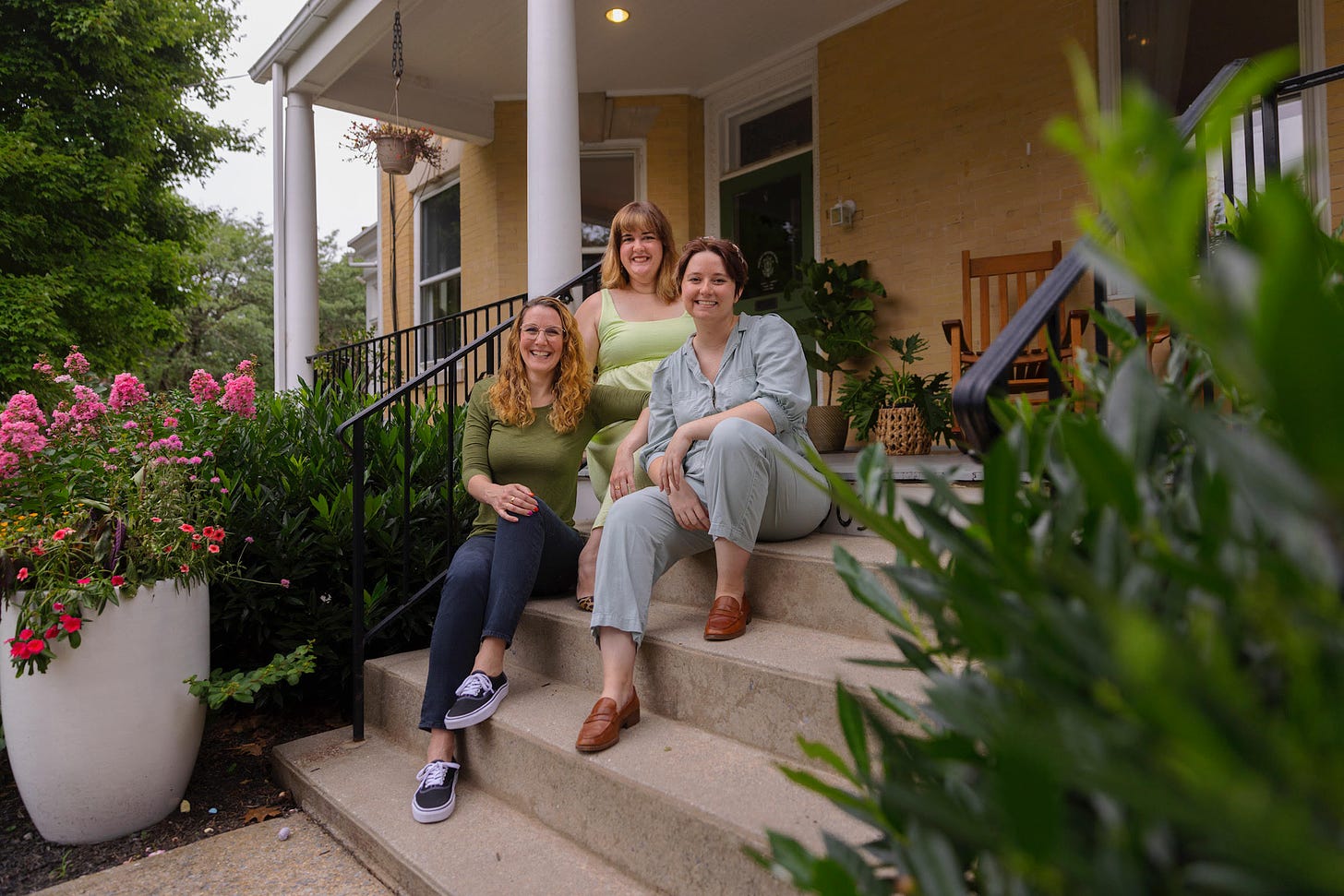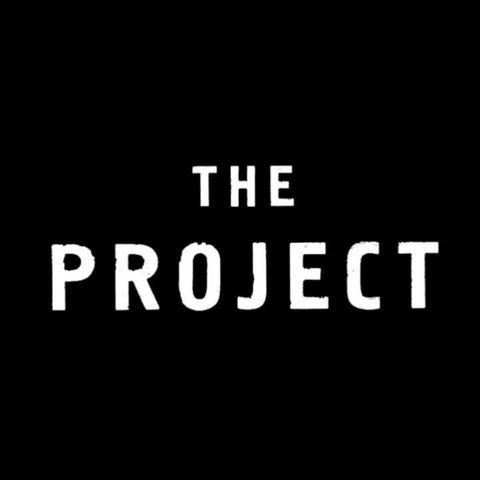In twenty-one days, the paperback edition of The Project comes out.
I’ve been looking forward to it despite the challenges posed by the current market1 because in the last year or so, I’ve noticed something: Lo and Bea’s story, with its particular brand of grief and loneliness, has reached readers it really seems to speak to, resonating with them in the way I’ve only ever hoped. For this, I can only credit a persistent and generous word-of-mouth and I’m grateful to everyone who has championed it since its original release. The idea of the book’s beautiful new design offering the possibility of making even more of those connections means a lot to me—so much so, I wanted to make its second outing a little special and arrived at something that will support one of my favorite indie bookstores in the process.
Pocket Books Shop is the eclectic, feminist bookstore of your dreams and we’ve teamed up to offer you this:
Purchase The Project from Pocket Book to receive a signed bookplate and themed-out stickers! Great, right? But here’s something even better: if you preorder The Project by November 20th, you’ll receive the bookplate and stickers plus an additional 15% off.
The team at Pocket—Austin, Julie, and Jess—approach my work with a level of empathy, care, and consideration that extends to all the books they sell and the readers they welcome into their store. Customers can expect bookshelves, boxes, events, recommendations and an in-person and online presence that understands the importance of expanding and enriching our perspectives through the inclusion and elevation of all perspectives. It’s an honor to partner with them on this.
I invited Austin to answer a few questions about her work as a bookseller and what exactly is required in our shared efforts as publishers, authors, and readers to uplift new voices, diversify our reading habits, and different ways we can support indie bookstores.
AN INTERVIEW AUSTIN CARTER, CO-OWNER, POCKET BOOKS


Why are books so important to you and what do you hope Pocket’s impact is on the individual customers who walk into your store?
Oh Courtney, you're setting me up to be saccharine right out of the gate! There’s no answer to this other than an extremely heartfelt one: books have always offered me the dual joys of escape—seeing a world beyond my small town, whether that’s in the past or future, the other side of the globe or another dimension entirely—and recognition—seeing myself, or parts of myself, or the me I might grow into, represented on the page. As an adult, I’ve turned to books (both fiction and nonfiction!) to help work through knotty ideas as I developed my ~ideology and my outlook on the world. What’s better than that?! I suspect that my co-owners, Jess and Julie, would have a similar answer to both parts of your question.
We want people to walk into our store and feel seen and safe . . . TERFs, homophobes, misogynists, and racists can sell their books elsewhere.
The customer experience of anyone walking into Pocket Books is a responsibility we take very seriously, and it's something we’ve talked about ad nauseam since day one. We believe that bookstores are community spaces that can feel like home, and we want people to walk into our store and feel seen and safe. For us, that means that we work hard to diversify our stock and highlight writers from underrepresented communities. It also means that we don’t ever want a title (or an author) on our shelves that makes someone feel uncomfortable—TERFs, homophobes, misogynists, and racists can sell their books elsewhere.2 We want our store to be a place where people feel safe to be curious—to try out a new genre without feeling like it doesn’t ‘belong’ to them, to expose themselves to new ideas and thinkers, and to take a chance on books they haven’t necessarily seen splashed across social media but that they’ll absolutely love.
How has your background in academia informed your approach as a bookseller?
First and foremost, it has made me very opinionated and angry!!! My academic expertise is in nineteenth-century American literature, specifically focusing on women’s writing, and so I have a lot of feelings when people start expounding on ‘the classics’ or sneer at genres like romance or YA. Spoiler: the most popular and most beloved books have always been by and about women, their lives, their thoughts, and their feelings. That knowledge translates into Pocket Books’ intense dedication to stocking the stories that matter most to us and having absolutely no tolerance for shame or ‘guilty pleasure’ reading.
Julie and Jess also met in grad school, so all three of us have that special grad student skill of consuming huge volumes of information and being able to digest and distill it quickly—this is obviously invaluable when it comes to the sheer number of books we put on our TBR stack. The other (and probably more salient) way that academia informs my current career is that I’ve spent many years perfecting the art of procrastination. Leading book club tonight but haven’t started the book yet? Newsletter due in two hours? Book review should’ve been done yesterday? NBD, just let me scroll TikTok for a few minutes and then I’ll get it done.
Some categories of books—such as horror, romance, and thriller—have established certain expectations amongst their respective readers. How does Pocket Books explore, expand upon, or subvert those expectations in the ways it features, displays, or talks about those books?
Ooh! How long can we talk about this? Forever? Ok, good.
So, first off, I think it’s important to talk frankly about how gross it is that the ~literary establishment has decided to silo off genre fiction as non-serious, self-indulgent, guilty pleasure reading while simultaneously using its massive sales to pay the bills. It’s giving . . . misogyny? Romance, ‘romantasy’ (or paranormal romance, fantasy romance, whatever you want to call it), and thrillers (especially domestic thrillers) are wildly popular genres that explore serious and complex topics. They also are feminized genres that often get pushed aside as ‘beach reads,’ ‘mommy thrillers,’ and ‘fairy porn.’ We . . . don’t play that game. At Pocket Books, we push against the expectations that non-genre readers might have by taking those books seriously! We read romance novels with just as critical an eye as we do prestige literary fiction, and we recommend them to all readers. If someone asks for a book with good neurodiversity rep, you best believe we’re pointing them straight to Helen Hoang or Meryl Wilsner, even if they “don’t read romance.”
I think it’s important to talk frankly about how gross it is that the ~literary establishment has decided to silo off genre fiction as non-serious, self-indulgent, guilty pleasure reading while simultaneously using its massive sales to pay the bills. It’s giving . . . misogyny?
We also try to be very conscious of the biases and expectations that develop among the ‘in-group’ of genre readers, and we like to push there, too. I shelve a lot of books in Horror that other stores might keep in general fiction because I really like to get people to take a closer look at what the genre has to offer. It’s not just the Stephen King books you remember from high school! Horror writers are doing some of the most exciting, innovative work right now—Indigenous writers like Erika T. Wurth and Stephen Graham Jones are changing the game, while writers like Alison Rumfitt and Gretchen Felker-Martin are pioneering a wild new world of trans horror.
YA Horror & Suspense is so incredibly robust and diverse right now, and I want everyone to read it! As booksellers, we have the privilege of getting a birds-eye view of what’s being published, which is why we’re so bummed when we walk into a store (especially a big box store) and see a wall of straight, cis, white romances and fantasy novels featuring a beautiful white girl who saves her kingdom from a scary, dark race. There’s actually so much more being published!
Bookselling requires you to keep your fingers on the pulse of what’s popular, or positioned to be. Pocket knows what’s up—of course!—but I’m continually struck by the team’s commitment to supporting early-career authors as well as backlist and lesser-known titles. How do you see beyond the buzz to discover truly undersung artists and do you have any tips for readers who want to make a similar commitment?
Um, thank you so much—the short answer is that we’re just book girls to our core. All we ever want to do is read, and we’ll happily say no to anything if it means we can sneak another chapter or five in. Our love language is ‘here, read this.’ Years ago, before we ever even dreamed of Pocket Books, Jess and I literally drove 8 hours from Southern California to San Francisco just so that we could meet up with Julie and discuss A Little Life in person because a phone call wasn’t enough. That’s the level of bookish fanaticism we’re talking about, here.
There are all sorts of rules and guidelines for booksellers to help keep the lights on in an industry with razor-thin margins and a billionaire supervillain eagerly gobbling up small businesses left and right, and we kind of listen to them. But also, in the words of our poet laureate Taylor Swift, this is our place, we make the rules. Jess and Julie are constantly telling me to chill out because I keep a bonkers list of ‘book deadlines’ and always give myself reading homework (#gradschooltrauma), but they are kind and wise and know that we only get one wild and precious life, so it’s fine to read that random paperback from 2007 if that’s what moves you.
My best tip for readers looking to see beyond the buzz is to ask: do they need me, and do they need me now? I’m your kooky socialist aunt telling you to follow the money—if you’re seeing a book everywhere, it’s probably because the publisher is throwing a lot of funding its way. When an author receives national media attention, is a celebrity book club pick, has a huge book tour, and is getting nonstop play on social media from gigantic accounts, they’re probably going to be fine. Jonathan Franzen doesn’t need your help to hit the NYT Bestsellers list.
But for a debut author, especially an author from a marginalized community, early sales count. Preorder numbers and first-week sales can make all the difference in whether or not that author gets sent on tour, or gets a little bit of marketing money thrown their way, or gets a second book deal. The #23for23 challenge in the romance community has been so fantastic, and I love authors like Adriana Herrera for putting it so plainly: how often do you think “oh, I should read that,” when you look at a book by a writer of color but then keep it on your imaginary TBR shelf vs how often do you impulse buy that new book by a white author that’s been all over Tiktok? When enough people fall prey to those implicit biases, it can mean a big loss for authors who don’t always get a second or third chance from the publishing industry.
That’s one of the reasons why we started Pocket Picks, our monthly subscription service. Each month, we select a new release novel by an early career author and package it up with some goodies (including an introductory letter, a sealed letter of our analysis to be opened after you’ve read the book, and another bonus like a signed bookplate or sticker). Month after month, we get to share a book with our subscribers that they probably wouldn’t have otherwise picked up, and it’s our absolute joy to do so. If you want to dedicate yourself to grabbing at least one incredible book that isn’t getting as much hype as it deserves per month, you can become a Pocket Picks subscriber! We happily ship.
Besides buying books, what are some ways readers can support indie bookstores they may not be aware of?
Buying books is obviously top tier, but you can also not buy books from companies that sell at a loss and make things that much harder for indies. (If they can afford to sell a brand new hardcover book for $15 while indies have to charge $29, there’s a reason . . . and it’s a sign that the playing field is far from level.) Follow indies on social media! Like and share our posts, which helps us pop up in other people’s feeds. Come to our events! Even if you don’t have money to purchase a book, attending an event helps us to know what our public is interested in. Buy and wear our merch! Tell your friends about us and bring them in!
What ways do you think publishing could better serve indie bookstores in their own efforts to better serve readers?
I’ve really enjoyed getting involved with the preorder campaigns run by publishers—offering an indie-exclusive goodie or edition of a book is a great way to help us snag customers who might otherwise order elsewhere. I wish publishers could lower the bar for entry a bit, as small bookstores just can’t order at the same volume as a chain or even a large indie like Powell’s or Parnassus. We often have to pass on signed copies or special editions because they’re only available in carton-level quantities, and we can’t always justify spending the money on 15 or 24 or 96 copies of a book all at once when it’ll take us months to sell that many copies of one title.
What are some ways authors can support indie bookstores that they might not be aware of, particularly those who are navigating store-exclusive opportunities?
I am well aware that authors are caught in a bind—even though they might desperately want to support indie bookstores, their contracts require them to promote Amazon links. But real ones know that Jeff Bezos isn’t handselling books or hosting meet-and-greet events or organizing launch parties or singing and dancing in reels to promote upcoming titles.
We love to work with authors however we can, and whew boy, a little promotion goes a long way. Even just a repost in your Instagram story can give a lil sales bump that so many of us desperately need just to keep the lights on.
We love to work with authors however we can, and whew boy, a little promotion goes a long way. Even just a repost in your Instagram story can give a lil sales bump that so many of us desperately need just to keep the lights on. Clear communication is also so helpful—can we get signed bookplates? Is there a preorder incentive we can offer our customers? How many stores are you working with—what’s going well, and what could change? The more we know, the better we can help!
What is a hand-selling moment you’re particularly proud of?
Jess and Julie constantly razz me about my forceful handselling—I’m notorious for just grabbing a book and telling someone they need it so seriously that they just trust me and buy it. Or maybe they’re just nervous not to? I don’t really care either way, because I feel so strongly about my recs! I did recently have a really joyous moment when a couple came in and just flew through the shelves making a huge stack of new releases; when I rang them up, I realized that they’d grabbed every book we’d featured on Instagram that week! They were like “YOU GOT US” and the million hours we spend on Canva felt very worth it.
A customer comes in. They’ve just finished The Project and now they need something a little less life-ruining. What book are you handing them?
Lol they came to the wrong bookseller for this one, but ok. If they’d like more wonderful YA with maybe fewer tears, I’d give them Ophelia After All by Racquel Marie (or her newer release, You Don’t Have a Shot).3 Fun fact! Racquel was one of my students in my former academic life, and then she graduated and started publishing beautiful, sweet, thoughtful books that I sell whenever I get the chance. If that customer said no, no, I just want something that will make me laugh, then the answer is clear: they’re leaving Pocket Books with a stack of Sam Irby’s incredible essay collections. I can cry-laugh just thinking about some of those pieces.
Thank you to Austin, Julie, and Jess for supporting The Project’s paperback release, and to Austin for taking the time to answer these questions and share further insights on what it means to be a part of this industry no matter what role you play!
I hope, if anything, Austin has made clear the level of negotiation it takes to meet the industry where it is, and to push it beyond its comfort zone—to the benefit of us all. It’s absolutely essential to support indie bookstores supporting diverse titles and authors to prevent the literary landscape from being aggressively homogenized. They’re doing the work! We can do it too. You can visit Pocket in person in Lancaster, or shop from their website. (And don’t forget about Pocket Picks!)
If you’re interested in supporting both The Project and Pocket by taking advantage of our purchase incentive, here’s two things to keep in mind: 1. you must place your order for The Project by November 20th to receive the discount. 2. The bookplates and stickers will be sent while supplies last and supplies are limited.
Get them while you can.
And stay tuned, because in the lead-up to pub, I’ll be revisiting and exploring The Project from some interesting new angles. In the meantime, enjoy this throwback. The vibes were so good.
Preorder The Project paperback from Pocket Books
Follow Pocket: Instagram, Facebook
courtneysummers.ca
instagram.com/summerscourtney
https://www.threads.net/@summerscourtney
Book sales are down! Discoverability is down! Not to mention a variety of mitigating factors authors are forced to bear both the burden and consequences of, despite not having the resources of their publishers to bridge those gaps. I hope you never underestimate your power as a reader. Thank you for every time you share it with my books. 💖
🙌
Love this pairing—I had the privilege of blurbing Racquel’s debut and this is what I said: “A sweet and tender ode to love and self-discovery. Racquel Marie's vibrant and insightful prose, and fresh, funny, fearlessly vulnerable characters make for a beautiful debut you won't want to miss. Ophelia After All is utterly lovely.”






What a fabulous bookshop & team 👏👏👏😁💖 Do you know if they will ship The Project pre-order bundle to the UK?